Key takeaways:
- Documentary filmmaking requires a balance of empathy and honesty, as it shapes real-life stories.
- Training in the film industry enhances technical skills, narrative sensibilities, and collaboration, crucial for creating impactful documentaries.
- Adaptability, thorough research, and strong communication are vital skills for documentary filmmakers to uncover authentic stories.
- Effective storytelling relies on a strong narrative arc and personal reflections, helping audiences connect on a deeper level.
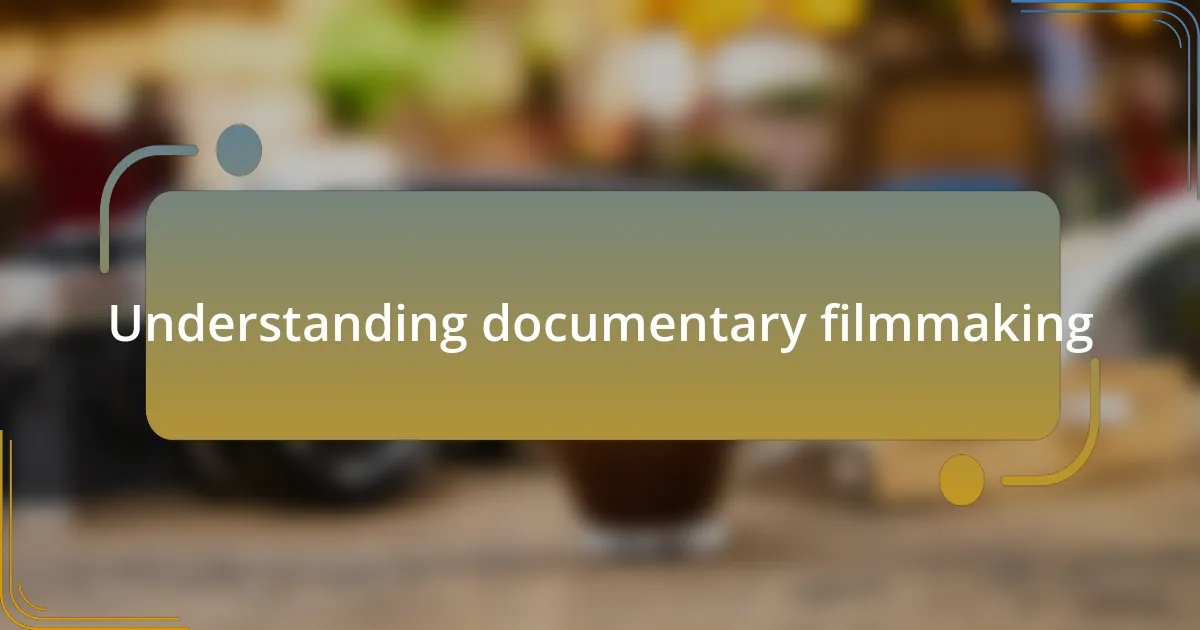
Understanding documentary filmmaking
Documentary filmmaking is a unique blend of storytelling and truth. When I embarked on my first documentary project, I was struck by the responsibility it carries. Unlike fictional narratives, every decision can impact the perception of real lives, and navigating that ethical landscape is something every filmmaker should internalize. How do we portray someone’s story without bias? It requires a delicate balance of empathy and honesty.
The heart of documentary filmmaking lies in capturing authentic moments. I remember a scene I filmed where the subject, a local artist, broke down while sharing her struggles. It was an emotional revelation that transformed the narrative for me. These moments often shape the story in unexpected ways and remind us that the core of documentary work is to reveal deeper truths about humanity.
One key element is effective research, which grounds your narrative within factual accuracy. In one of my projects, I spent weeks interviewing experts to ensure the history I presented was rich and nuanced. It taught me that a well-informed perspective can significantly elevate a documentary’s impact. But how do we keep our own voice while presenting facts? Striking that balance is crucial, and it often takes experience and introspection to master.

Importance of film industry training
Training in the film industry is vital for refining the technical skills and narrative sensibilities that are essential for successful documentary filmmaking. I recall attending a workshop where industry experts passionately dissected the nuances of visual storytelling. This experience highlighted how vital it is to hone one’s craft and learn from seasoned professionals who have navigated the challenges inherent in this field. Would I have gained such deep insights without that training? Probably not.
Moreover, understanding the importance of collaboration in documentary filmmaking cannot be overstated. During a project, I worked with a diverse crew, each member bringing unique expertise. The collective input not only enhanced the quality of our final piece but also fostered an environment where creativity flourished. I often wonder: how many amazing stories are lost simply because filmmakers try to tackle everything alone? It’s a reminder that training helps us recognize the value of teamwork.
Finally, a structured approach to film training offers invaluable networking opportunities. I remember forging connections with fellow filmmakers who later became collaborators on various projects. The relationships I built in training sessions often opened doors I never imagined possible. In an industry as competitive as film, these connections can be the difference between a project that stays on the shelf and one that reaches an audience.
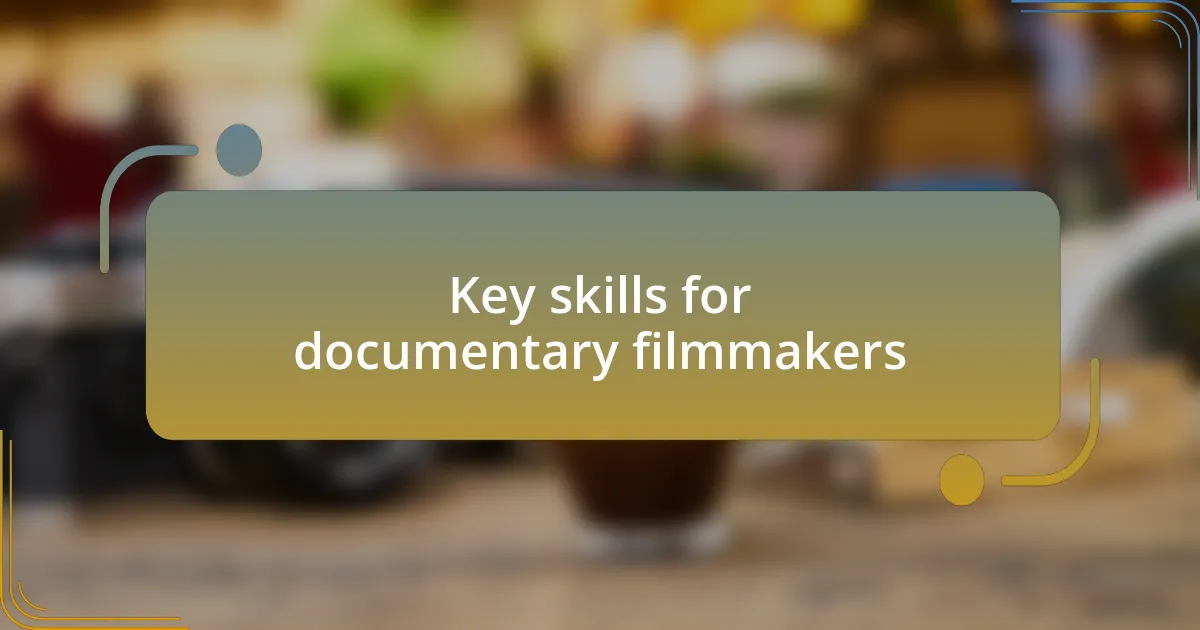
Key skills for documentary filmmakers
One key skill for documentary filmmakers is adaptability. There have been moments on set when things didn’t go as planned—equipment failures or unexpected weather changes. I learned the hard way that being able to pivot and reassess the situation often leads to discovering a more compelling story. Have you ever found that the best moments come from embracing the unknown rather than sticking rigidly to a script?
Equally important is the ability to conduct thorough research. I remember diving deep into the topic of social justice for a documentary I was working on. The more I learned, the better I was able to frame my interviews and narrative. It’s astonishing how much richer your film can become when you bring a well-rounded perspective to the table. I always ask: how can you tell a story authentically if you don’t fully understand its context?
Finally, strong communication skills are indispensable. During one of my projects, I found that my ability to connect with my subjects often determined the depth of our conversations. By establishing trust and rapport, I was able to uncover nuanced stories that transformed my documentary. Have you thought about how important it is to listen just as much as you speak? It’s a key part of gathering authentic material that resonates with viewers.
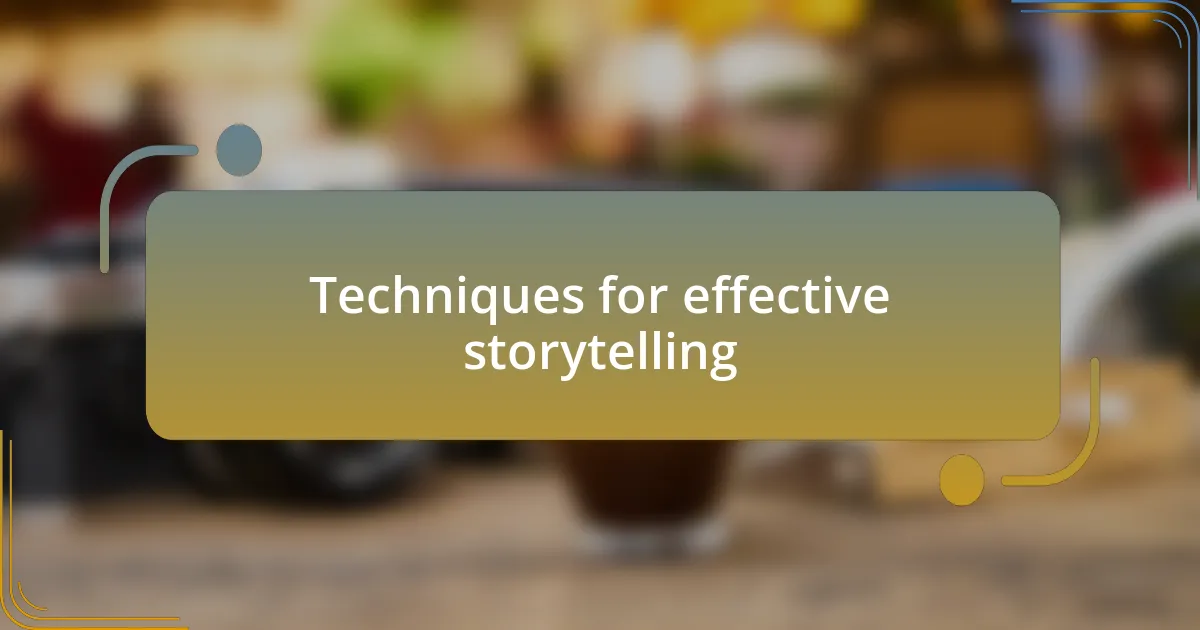
Techniques for effective storytelling
When it comes to effective storytelling in documentaries, I’ve learned that a strong narrative arc is crucial. I recall a project where I structured the film around a central conflict, which kept viewers engaged throughout. I often ask myself: what journey do you want your audience to embark on? It’s essential to not just present facts, but to weave them into a story that has a beginning, middle, and end.
Visual storytelling techniques can also elevate your narrative. I vividly remember focusing on close-ups during interviews; the subtle expressions of my subjects often conveyed more than their words. Do you ever notice how a single glance can capture the weight of a moment? By using a variety of shots and angles, filmmakers can evoke the right emotions and guide the audience’s experience seamlessly.
Lastly, incorporating personal stories can create powerful connections. In one documentary, I included my own reflections on the challenges faced by the community I was documenting. This not only humanized the narrative but made it relatable. How can you use personal experience to enrich your storytelling? When you share your own journey, it invites the audience to connect on a deeper level, often transforming their viewing experience into something profoundly impactful.
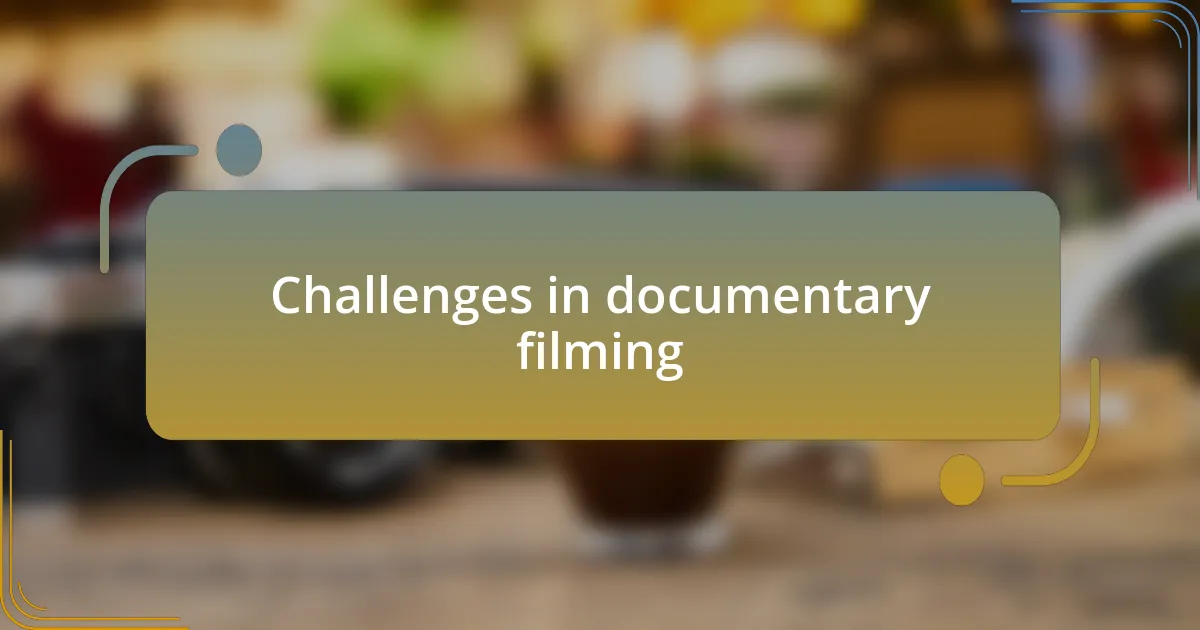
Challenges in documentary filming
Filming documentaries comes with its fair share of challenges that can be quite daunting. For instance, I remember a time when access to my subjects was unexpectedly limited due to unforeseen circumstances, which forced me to adapt my entire shooting schedule. How do you manage when the story you want to tell is just out of reach? Flexibility and quick thinking become paramount in these situations.
Another significant challenge is capturing the raw emotions of your subjects without influencing their authenticity. During one project, I found that simply being present with the camera made people feel self-conscious. Have you ever noticed how genuine moments often happen when you least expect them? This realization pushed me to rethink my approach, focusing more on creating a comfortable environment for more authentic interactions.
Finally, navigating legal and ethical considerations is a constant hurdle. I once faced lengthy negotiations for permission to film in a private venue, which made me rethink how I approached storytelling. How do you balance the need for compelling content with respecting boundaries? I learned that transparency and clear communication can often pave the way for smoother collaborations.
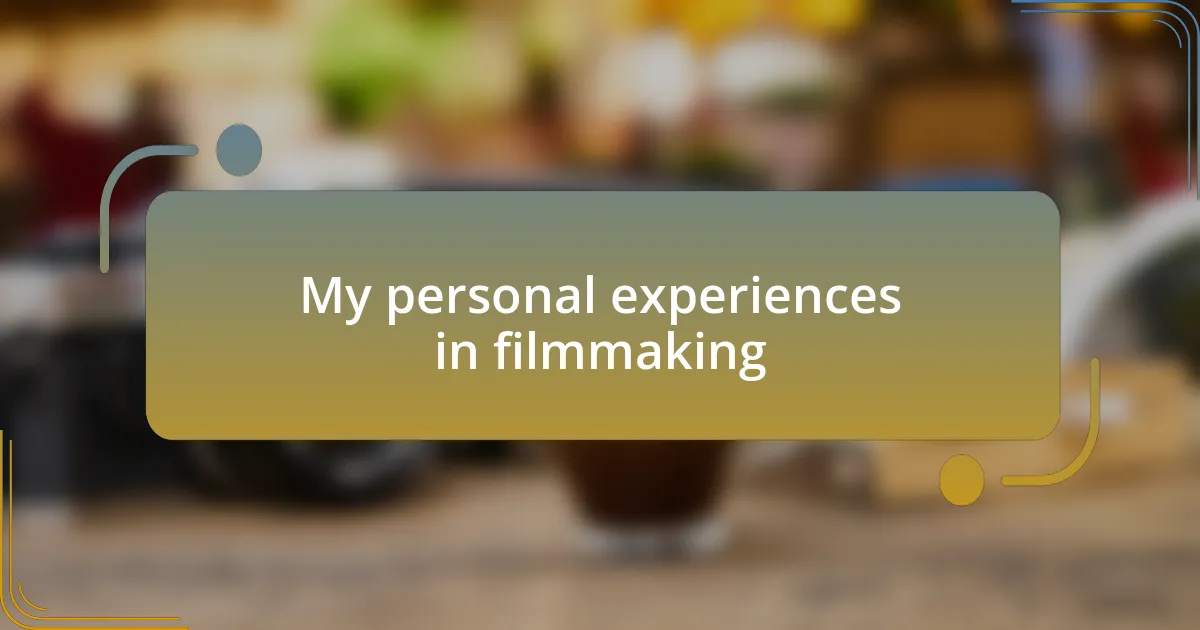
My personal experiences in filmmaking
Filmmaking has often felt like a rollercoaster ride, and one of my most memorable experiences occurred during a documentary shoot in a small, remote town. I was completely immersed in the local culture, yet I had to work hard to earn the trust of my subjects. I vividly remember sitting over coffee with a resident who was initially hesitant. Isn’t it fascinating how a simple conversation can open doors that seemed closed? That warmth transformed our interaction and allowed me to capture stories that felt truly authentic.
On another occasion, I encountered a technical mishap that threatened to derail an entire day of filming. The battery of my primary camera died right as an emotional scene was unfolding. How often do we take technology for granted? In that moment, I had to think on my feet, quickly transitioning to an older backup camera. Surprisingly, this situation led to a more candid interaction with my subjects, who seemed more at ease with the less intimidating gear. It was a humbling reminder that sometimes setbacks can yield unexpected blessings.
Every project I undertake feels deeply personal, and that’s especially true when I strive to connect with the stories of marginalized voices. During one project, I worked with individuals who had faced significant hardships, and their courage struck a chord in me. Do you ever wonder how much vulnerability can enrich a narrative? I found that sharing my own uncertainties fostered a deeper bond, allowing them to open up in ways I hadn’t anticipated. It’s moments like these that remind me why I was drawn to documentary filmmaking in the first place.
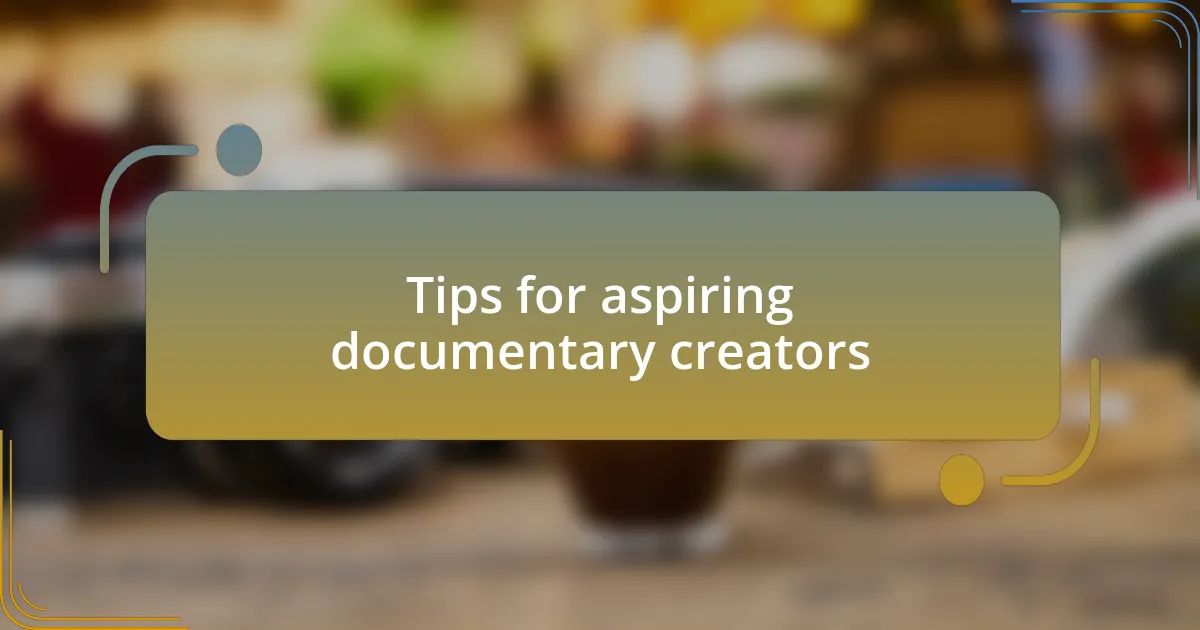
Tips for aspiring documentary creators
When embarking on a documentary project, it’s crucial to approach storytelling with empathy. I recall a time when I interviewed a group of survivors of a natural disaster. Initially, they were guarded, unsure of how their stories would be presented. I learned to listen more than I spoke, creating a safe space for them to share their experiences. Have you ever realized that genuine connection often leads to the most powerful narratives?
Another important tip is to be adaptable. During a shoot in a bustling urban setting, my planned interview fell through at the last minute. I had to pivot quickly and capture impromptu conversations with local street vendors instead. This unexpected turn transformed the documentary into a rich tapestry of community voices that I hadn’t initially considered. How often do we limit ourselves to a rigid plan? Flexibility can turn obstacles into opportunities.
Finally, invest time in research about your subject. Before my latest project on food sustainability, I spent weeks immersing myself in current issues and trends. This groundwork not only helped frame my questions but also sparked meaningful discussions with experts and community members. When was the last time knowledge truly empowered your creative process? I’ve found that a solid foundation in your topic can elevate your documentary from good to outstanding.